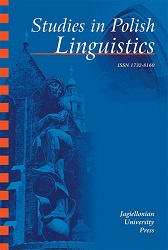Can Tense Be Subject to Grammatical Illusion? Part 1: A Design of an ERP Study on the Processing of Tense and Aspect Mismatches in Compound Future Constructions in Polish
Can Tense Be Subject to Grammatical Illusion? Part 1: A Design of an ERP Study on the Processing of Tense and Aspect Mismatches in Compound Future Constructions in Polish
Author(s): Joanna Błaszczak, Juliane DomkeSubject(s): Syntax, Lexis, Semantics, Western Slavic Languages
Published by: Wydawnictwo Uniwersytetu Jagiellońskiego
Keywords: processing of compound future constructions; tense and aspect mismatches; grammatical illusion; tense illusion; ERP; Polish;
Summary/Abstract: This two-part paper is concerned with the processing of two types of compound future in Polish, with infinitival and participial complements. In the first part we present a design and predictions of an ERP study whose goal was to monitor the EEG correlates of two types of temporal mismatches: i) tense mismatches between the future auxiliary and the past tense modifier wczoraj (‘yesterday’) relative to the jutro (‘tomorrow’) baseline and ii) aspect mismatches between the future auxiliary and the perfective aspect of the lexical complement relative to the imperfective baseline. In addition, we wanted to assess whether matching tense specifications in different words of a sentence can cause grammatical illusions. To this aim, we tested whether the presence of the adverb wczoraj (‘yesterday’) (specified for [past]) could give rise to an illusion of grammaticality for perfectives as l-participles (allegedly [past] marked), but not as infinitives (not having any [past] specification). The study and its results as well as a general discussion of the findings will be presented in Part II of the paper.
Journal: Studies in Polish Linguistics
- Issue Year: 14/2019
- Issue No: 4
- Page Range: 149-170
- Page Count: 22
- Language: English

